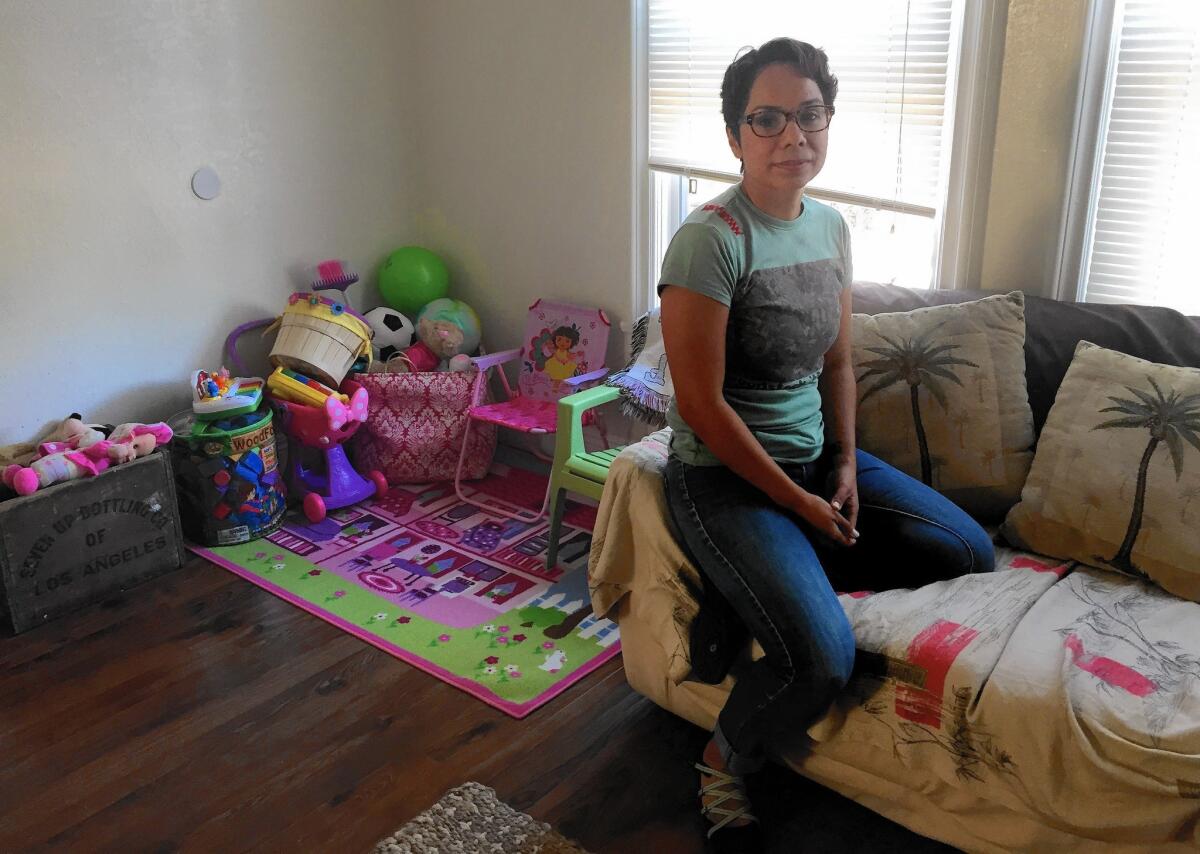A female Navy veteran recalls the harassment and humiliation

- Share via
She wasn’t dodging bullets or disabling IEDs. Former Petty Officer Laura Estrada enlisted in the U.S. Navy in 1997 and spent most of her four-year deployment on an aircraft carrier that cruised the Atlantic seaboard on training maneuvers.
Yet Estrada finished her tour of duty with PTSD — or what the armed services now call MST, military sexual trauma.
She’d been assigned to an all-male crew; women were a rarity on Navy ships then. Her commander welcomed her with a rant: Women had no business in a ship’s engine room, he told Estrada, who was being trained as a mechanic.
On duty, Estrada was routinely harassed, crudely propositioned and publicly humiliated. When she protested, she was mocked. When she complained, she was ignored.
Men would expose themselves and try to grope her, and get angry when they were rebuffed. “Some days I was a whore,” she said. “The other days I was a lesbian.… It got so ordinary, it began to seem normal. You knew you had to be always on guard, always expecting the worst.”
It took years before Estrada could talk about what happened — and more than a decade to understand how it had warped her psyche.
She was honorably discharged, and when she returned to Los Angeles in 2001, her life began to unravel. She became an electrical apprentice and found a job she liked. But she battled debilitating bouts of depression, felt she couldn’t trust anyone and isolated herself. A “heaviness,” she called it.
She married a sailor who’d served with her and seen what she had been through. The marriage didn’t last; that taught Estrada not to trust herself. “There was such a sense of instability in everything,” she said. “I couldn’t do anything right.”
At 39, she wound up pregnant; that relationship also failed. Her daughter’s birth sent her spiraling into a severe post-partum depression.
“I felt I had nothing to offer my child,” she said. “I just wanted to die.”
::
The U.S. Department of Veterans Affairs estimates that 1 in 5 female veterans are sexually assaulted or raped in the military. Almost 4,500 of the nation’s 58,000 homeless vets are female, and half of those women said they’d been sexually victimized while serving their country.
Amy Turk of the Downtown Women’s Center suspects the numbers are even higher. “Sexual PTSD is a common thread, but most of the women aren’t comfortable sharing that,” she said
With a federal grant, the center is helping dozens of female veterans find housing, jobs, child care and counseling. But hundreds more are sleeping in shelters, on couches, in cars and on sidewalks, Turk said.
Estrada, 41, was sleeping with her toddler on a couch at her sister’s home until last month, when the Downtown Women’s Center helped her find and furnish a small West Adams apartment. She’d spent so many years feeling like a disappointment, she said, “it feels good that they believe I can actually pull myself back up.”
Her recovery took root last year in counseling sessions with VA therapist Terri Davis, a female veteran who understood the toll of service-related sexual trauma.
On her first visit, Estrada recalled, she wanted to give up. Just walking into the VA waiting room, crowded with men, “I felt like I was back on that ship, with all eyes on me,” she said. “The catcalls, the leering, it all came back.”
In sessions with Davis and other military women, she was finally able to let it all come out.
::
For years, Estrada listened to the voice in her head that made light of what she’d been through:
Every woman went through this. We weren’t in a war. Other women had it much worse. What gives you the right to complain?
“I knew that what happened to me was happening to other women. But even amongst ourselves,” she said, “we really didn’t talk about it.”
They felt hemmed in — physically, emotionally and professionally — and focused on survival. “So we’d just shove it under the rug,” she said.
Some women coped by trying to fit in. “They’d flirt with the guys, sit on their laps, let them grope them,” Estrada said. They blamed women like Estrada for the tension.
“They’d say we’re why women have a hard time. ‘The guys aren’t doing anything. What’s the big deal? Don’t be so rude.’ I still hear that in my head sometime: ‘You’re such a bitch for complaining.’”
And complaining didn’t help. She remembers when a high-ranking woman filed a grievance because a crewman had groped her. “She was pressured to rescind the complaint because it might hurt his career.
“We were all so mad at her; we felt betrayed and some of the women shunned her,” Estrada said. “But I understand now why she didn’t go through with it.”
I asked her if she feels her country let her down. She stared into space for a long moment, then shook her head.
Her father fought in the Korean War. Her older brother served in the Navy and the National Guard. Her family tried to talk her out of dropping out of college to enlist.
“I wish I’d known what I was getting into. But I’ll be all right,” she said. “I was a woman … and I served this country the best I could.”
Twitter: @SandyBanksLAT
More to Read
Sign up for Essential California
The most important California stories and recommendations in your inbox every morning.
You may occasionally receive promotional content from the Los Angeles Times.











